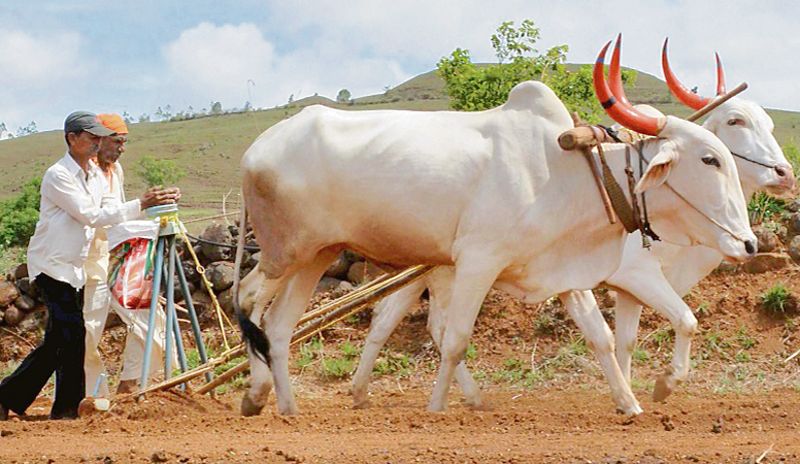
LOPSIDED: The big players are the biggest violators of the farm subsidy regime, but they spare no effort in pointing to the developing countries. PTI
Devinder Sharma
Food & Agriculture Specialist
IN the light of the farmers’ demand for according a legal sanctity to Minimum Support Price (MSP), a question that is being repeatedly asked is whether any such move will violate the World Trade Organisation (WTO) provisions.
If India needs ‘Peace Clause’ to build food and nutritional security, a guaranteed MSP is the price shield that Indian farmers need to protect their livelihoods.
This assumes importance, given the continuous tirade by some of the rich developed countries, led by the US, the EU and Canada, blaming India for breaching the subsidy limits. While India maintains that its MSP operations and the public stockholding for food and livelihood security is WTO compliant, this hasn’t deprived some member countries from raking up this contentious issue time and again. With developed countries eyeing a significant proportion of the huge market that is available, given an estimated 80-million plus nutritionally-deficit population in India, which is covered under the National Food Security Act, the issue of restricting public stockholding so as to allow for subsidised imports has always been on the agenda.
Even though the 12th Ministerial Conference, which was scheduled to be held at Geneva from November 30 to December 3, has been postponed after Switzerland imposed travel restriction following the outbreak of Omicron, the new virus variant, the issue was hotly debated in the run-up, leading to the preparation of the final draft for the negotiations. Although it didn’t find place in the final draft, some countries had even gone to the extent of vaguely proposing that procurement of ‘traditional staple food crops’ be restricted to 15 per cent of the total production. If this had found approval, and given India’s dismal ranking at 101 among 116 countries on the Global Hunger Index 2021, the severe implications any such move would have on ensuring food and nutritional security were certainly worrisome.
It was at the Bali WTO Ministerial Conference in 2013 that developing countries had managed to wrest an interim ‘Peace Clause’ protection that acted as a safeguard for countries like India. While developing countries were expected to cap the subsidy support through administered prices at 10 per cent of the product-specific value, called de minimis support, for the rich countries, the permissible limit (de minimis) allowed is 5 per cent. Since the US, the EU and other members of the Cairns Group (a group of exporting countries) had been continuously raising the issue of India exceeding the outer limits in case of wheat and rice, calling it as trade distorting, the G-33 Group (a group of 47 developing countries) are asking for a permanent solution for the challenge they collectively face on meeting the food, livelihood and nutritional security of the small holders as well as the nutritionally poor.
In 2018-19, taking resort to the clause that protects developing countries from breaching the permissible limit, India had informed the WTO that it had crossed the de minimis ceiling in case of rice. The clause protects developing countries from being drawn into any dispute, even if it exceeds the subsidy ceiling. This is what infuriates developed countries, including the Cairns Group, which is keen that the clause protection is taken away. The other objection by the developed countries is the upheaval subsidised grains cause to the global trade. With the G-33 agreeing not to export any quantity from the procured food stocks, at least the issue of procurements causing trade distortions has been put to rest.
While in 2018, India and China had put up a joint proposal before the WTO, asking for eliminating the $160 billion worth of trade distorting subsidies the rich countries provide using the Aggregate Measure of Support (AMS) provisions, more recently, a fresh submission by India, in September 2021, calls for reducing distortions in global agricultural trade. Pointing to how asymmetrical trade rules have tilted the balance against the developing countries, India categorically states: ‘Seven members — the EU, Japan, the US, Russian Federation, Switzerland, Canada and Norway — have more than 96 per cent of the Final Bound Aggregate Measure of Support (FBAMS) global entitlement, while the remaining member countries have less than 4 per cent.’ Simply put, it means the big players are the biggest violators of the farm subsidy regime, but spare no effort in pointing to the developing countries.
In the US and Canada, the dairy sector alone received more than 50 per cent of the product-specific support over the period. Very cleverly, the product-specific support is now being disbursed among non-product specific support to show how questionable subsidies are being brought down in some important commercial trading activities. For instance, dairy and sugar together had a share of 91 per cent in product-specific support in the US in 1995. It declined to 37 per cent in 2001, and further dipped to 18 per cent in 2014. But while the share of dairy and sugar declined progressively, the share of cotton and corn increased from 2 per cent in 1995 to 28 per cent in 2001, and then to 40 per cent in 2014. Similarly in the EU, the share of butter, skimmed milk powder and wheat has increased from 17 per cent in 1995 to 78 per cent in 2010.
While the developed countries accuse India of breaching the subsidy limit on rice, wheat, sugar and cotton, a look at their own subsidy support tells you how unfair the trade regime has been. While India’s subsidy support for rice now exceeds the permissible limit of 10 per cent, the US gives 82 per cent product-specific support on rice, and the EU provides 66 per cent, a flagrant violation of the WTO norms. Similarly, while the US subsidy support for sugar is 66 per cent, the EU is giving twice as much — 120 per cent. A careful look at the entire range of trade distorting subsidies the rich countries provide shows how massive subsidies in commercially important commodities (and also processed foods) results in lowering the international prices. It’s not competitiveness but subsidies that determine the international prices.
If ‘Peace Clause’ is a protection that India needs to build food and nutritional security, a guaranteed MSP is the price shield that Indian farmers need to protect their livelihoods.
Join Whatsapp Channel of The Tribune for latest updates.




























